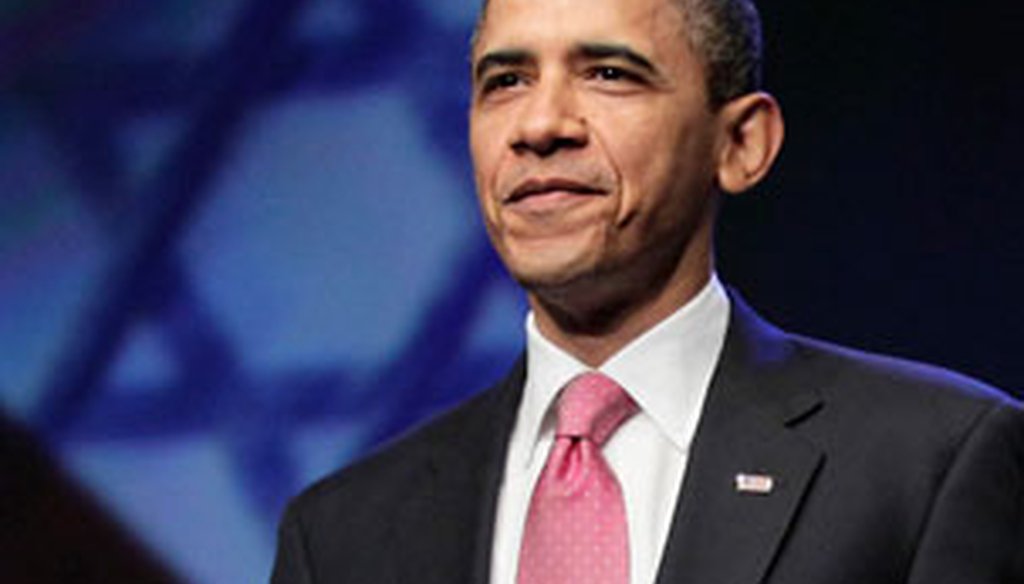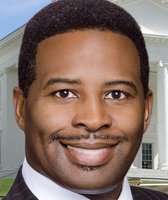Get PolitiFact in your inbox.

President Obama reiterated his position on Israel's borders during a May 22 speech to the American Israel Public Affairs Committee.
Virginia Republicans were quick to criticize President Obama for recently urging Israel to seek peace with Palestinians by using borders that existed prior to the Six Day War in 1967 as a start to land negotiations.
In a barrage of news releases, several state Republicans twisted Obama’s comments.
*"President Obama’s call for Israel to return to its 1967 borders was a misguided approach that harms our alliance with Israel, the strongest democracy in the region, and undermines the overall peace process," U.S. Rep. Robert Hurt, R-5th, wrote on May 19.
*"President Obama’s call for Israel-Palestinian negotiations with Israel forfeiting her lands and returning to the borders of pre-1967 represents a dangerous shift in U.S. policy concerning Israel," George Allen, who has announced his 2012 candidacy for the U.S. Senate, wrote on May 20.
*"President Obama’s call for Israel to reinstate its 1967 borders ignores the greatest obstacle to peace —namely the Palestinian Authority’s alignment with Hamas," wrote U.S. Rep. Scott Rigell, R-2nd, on May 20.
Did Obama really break with U.S. policy and call on Israel to return to its 1967 borders?
No.
Here’s exactly what Obama said in a May 19 speech at the State Department:
"The borders of Israel and Palestine should be based on 1967 lines with mutually agreed swaps, so that secure and recognized borders are established for both states."
After a few days controversy, Obama sought to set aside any confusion in May 22 speech to the American Israel Public Affairs Committee, a powerful pro-Israel lobby.
"It was my reference to the 1967 lines -- with mutually agreed swaps -- that received the lion’s share of attention, including just now," Obama said. "And since my position has been misrepresented several times, let me reaffirm what `1967 lines with mutually agreed swaps’ means.
"By definition, it means that the parties themselves -– Israelis and Palestinians -– will negotiate a border that is different than the one that existed on June 4, 1967. That’s what mutually agreed-upon swaps means. It is a well-known formula to all who have worked on this issue for a generation. It allows the parties themselves to account for the changes that have taken place over the last 44 years.It allows the parties themselves to take account of those changes, including the new demographic realities on the ground, and the needs of both sides."
Israeli Prime Minister Binyamin Netanyahu gave a nod to Obama during a May 24 speech to a joint session of Congress.
"The precise delineation of those borders must be negotiated," he said. "We will be very generous in the size of a future Palestinian state. But, as President Obama said, the border will be different than the one that existed on June 4, 1967. Israel will not return to the indefensible lines of 1967."
But after the speech, Rep. Rob Wittman, R-1st, put out this statement: "I was extremely disappointed with the comments by the President last week as he endorsed a plan for Israel to return to its 1967 borders, a position described by PM Netanyahu as 'Indefensible.’"
Our Sources
The White House, Remarks by the President on the Middle East and North Africa, May 19, 2011.
The White House, Remarks by the President at the AIPAC Policy Conference 2011, May 22, 2011.
The Washington Post, Michelle Bachmann Twists Obama’s Words on Israel, May 25, 2011.
Virtual Jerusalem, Speech by Prime Minister Binyamin Netanyahu to a Joint Meeting of the United States Congress, May 24, 2011.
U.S. Rep. Robert Hurt, Comments on the President’s Middle East Speech, May 20. U.S., May 19.
George Allen, Does Tim Kaine Stand With President Obama or Israel?, May 20.
U.S. Scott Rigell, I Stand With Israel, May 20.
U.S. Rep. Rob Wittman, Wittman Welcomes Comments by Israeli Prime Minister Netanyahu, May 24.














































